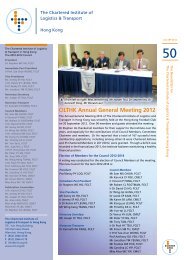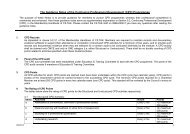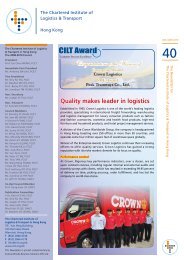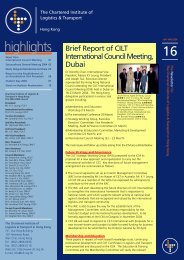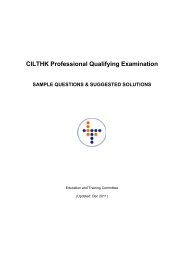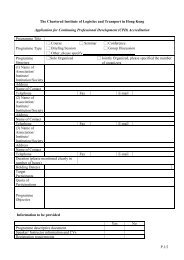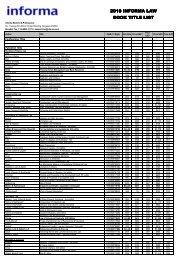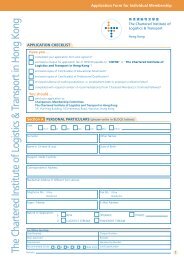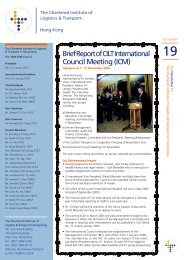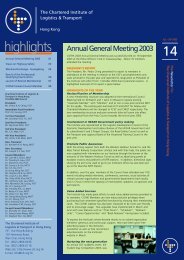to view file - The Chartered Institute of Logistics and Transport in ...
to view file - The Chartered Institute of Logistics and Transport in ...
to view file - The Chartered Institute of Logistics and Transport in ...
You also want an ePaper? Increase the reach of your titles
YUMPU automatically turns print PDFs into web optimized ePapers that Google loves.
CILTHK Newsletter issue 8 11<br />
3. Attitudes <strong>to</strong> car<br />
ownership<br />
In order <strong>to</strong> gauge what future car<br />
ownership rates would be amongst<br />
young people as they grow older<br />
<strong>and</strong> what their attitudes <strong>to</strong> car<br />
ownership were, respondents were<br />
asked <strong>to</strong> say which <strong>of</strong> four<br />
statements best describes their<br />
situation. Responses were as<br />
follows:<br />
Table 1. Intentions <strong>of</strong> own<strong>in</strong>g a car<br />
Statement Number Percent<br />
I <strong>in</strong>tend <strong>to</strong> buy<br />
a car one day, but 133 41<br />
it is not a priority<br />
I have no <strong>in</strong>tention<br />
<strong>of</strong> buy<strong>in</strong>g a car <strong>in</strong> 78 24<br />
the next 10 years<br />
I will buy a car<br />
as soon as I can 86 27<br />
afford one<br />
I would buy a car<br />
now, but park<strong>in</strong>g is 26 8<br />
difficult/expensive<br />
<strong>The</strong> results <strong>of</strong> this table are<br />
simultaneously comfort<strong>in</strong>g <strong>and</strong><br />
dangerous. On the comfort<strong>in</strong>g side,<br />
24% <strong>of</strong> respondents stated that<br />
they had no <strong>in</strong>tention <strong>of</strong> buy<strong>in</strong>g a<br />
car <strong>in</strong> the next 10 years. This is<br />
quite a high percentage. Afurther<br />
41% replied that buy<strong>in</strong>g a car was<br />
not a priority. However, 27% said<br />
that they would buy one when they<br />
can afford one <strong>and</strong> 8% said they<br />
would buy one only park<strong>in</strong>g is <strong>to</strong>o<br />
difficult/expensive. Overall then,<br />
three quarters <strong>of</strong> respondents<br />
showed some <strong>in</strong>tention <strong>of</strong> own<strong>in</strong>g<br />
a car.<br />
When further asked about the<br />
likelihood <strong>of</strong> their buy<strong>in</strong>g a car <strong>in</strong> the<br />
next 5 years, 10% answered very<br />
likely, 35% quite likely, 35% not very<br />
likely <strong>and</strong> 19% not at all likely. Thus,<br />
45% stated that it was either very or<br />
quite likely that they would buy a car<br />
<strong>in</strong> the next 5 years. Aga<strong>in</strong>, the<br />
prospects for Hong Kong’s traffic <strong>and</strong><br />
environment, as well as the impact<br />
on the economy <strong>of</strong> congestion, look<br />
bery grim if car ownership among<br />
this cohort were effectively <strong>to</strong><br />
<strong>in</strong>crease by ten fold <strong>in</strong> the com<strong>in</strong>g<br />
years. This would take car ownership<br />
amongst the young <strong>to</strong> the same level<br />
as that <strong>in</strong> western countries.<br />
<strong>The</strong> likelihood <strong>of</strong> buy<strong>in</strong>g a car<br />
varied significantly with area.<br />
Fifteen percent <strong>of</strong> respondents<br />
liv<strong>in</strong>g <strong>in</strong> the New Terri<strong>to</strong>ries th<strong>in</strong>k it<br />
is very likely that they will buy a car<br />
<strong>in</strong> the next 5 years, compared <strong>to</strong><br />
only 3% <strong>of</strong> those liv<strong>in</strong>g on the<br />
Isl<strong>and</strong> <strong>and</strong> conversely, only 15% <strong>of</strong><br />
respondents <strong>in</strong> the New Terri<strong>to</strong>ries<br />
th<strong>in</strong>k they are not at all likely <strong>to</strong> buy<br />
a car compared <strong>to</strong> 21% on the<br />
isl<strong>and</strong>. Explanations for this are<br />
probably the same as those<br />
discussed above <strong>in</strong> relation <strong>to</strong><br />
family car ownership.<br />
Likelihood <strong>of</strong> buy<strong>in</strong>g a car <strong>in</strong> the<br />
next 5 years also differs significantly<br />
between men <strong>and</strong> women. Fifty<br />
two percent <strong>of</strong> men said they<br />
would be cither quite likely or very<br />
likely <strong>to</strong> buy a car <strong>in</strong> the next five<br />
years compared <strong>to</strong> 42% <strong>of</strong> women,<br />
<strong>and</strong> 25% <strong>of</strong> women said they were<br />
not at all likely <strong>to</strong> buy a car<br />
compared <strong>to</strong> only 9% <strong>of</strong> men.<br />
Analysis <strong>of</strong> the results also showed<br />
that 39% <strong>of</strong> respondents agreed<br />
they would be much happier if they<br />
had a car. Only 32% disagreed. On<br />
a more positive note, 47% agreed<br />
that public transport was so good<br />
they did not need a car. Just over<br />
50% <strong>of</strong> respondents disagreed that<br />
people suffer without a car.<br />
4. Conclusions<br />
Car ownership is currently very low<br />
amongst the young people <strong>of</strong> Hong<br />
Kong <strong>and</strong> young people are<br />
consequently very dependent for<br />
their travel on public transport.<br />
However, there appears <strong>to</strong> be quite<br />
a substantial pressure for car<br />
ownership <strong>to</strong> <strong>in</strong>crease <strong>in</strong> the future.<br />
Forty five percent <strong>of</strong> young people<br />
<strong>in</strong> the survey stated that they are<br />
either very or quite likely <strong>to</strong> buy a<br />
car <strong>in</strong> the next 5 years. This<br />
pressure is particularly obvious <strong>in</strong><br />
the case <strong>of</strong> men <strong>and</strong> non-students<br />
as well as for those liv<strong>in</strong>g <strong>in</strong> the<br />
New Terri<strong>to</strong>ries. In general, only<br />
32% <strong>of</strong> young people <strong>in</strong> the survey<br />
disagreed that public transport was<br />
so good that they did not need a<br />
car. It appears, therefore, that it is<br />
not that young people need a car<br />
as such, most <strong>of</strong> them are pretty<br />
satisfied with public transport. <strong>The</strong>y<br />
would, however, be happier with<br />
one. This suggests that if the<br />
government wants <strong>to</strong> ma<strong>in</strong>ta<strong>in</strong> car<br />
ownership at its current low level, it<br />
should consider runn<strong>in</strong>g a<br />
campaign <strong>to</strong> de-advertise the car<br />
whilst simultaneously promot<strong>in</strong>g<br />
the image <strong>of</strong> public transport.<br />
References<br />
Hong Kong <strong>Transport</strong> Bureau, 2001.<br />
www.<strong>in</strong>fo.gov.hk/tb<br />
Acknowledgements:<br />
<strong>The</strong> author would like <strong>to</strong><br />
acknowledge the f<strong>in</strong>ancial support<br />
<strong>of</strong> <strong>The</strong> Kowloon Mo<strong>to</strong>r Bus<br />
Company (1933) Limited for this<br />
research. Full copies <strong>of</strong> the report<br />
can be obta<strong>in</strong>ed from the author<br />
(price $HK50) at:<br />
CUPEM,<br />
<strong>The</strong> University <strong>of</strong> Hong Kong,<br />
8/F Knowles Build<strong>in</strong>g,<br />
Pokfulam, Hong Kong.<br />
E-mail: slcull<strong>in</strong>@hkucc.hku.hk<br />
Fax: 2559 0468



